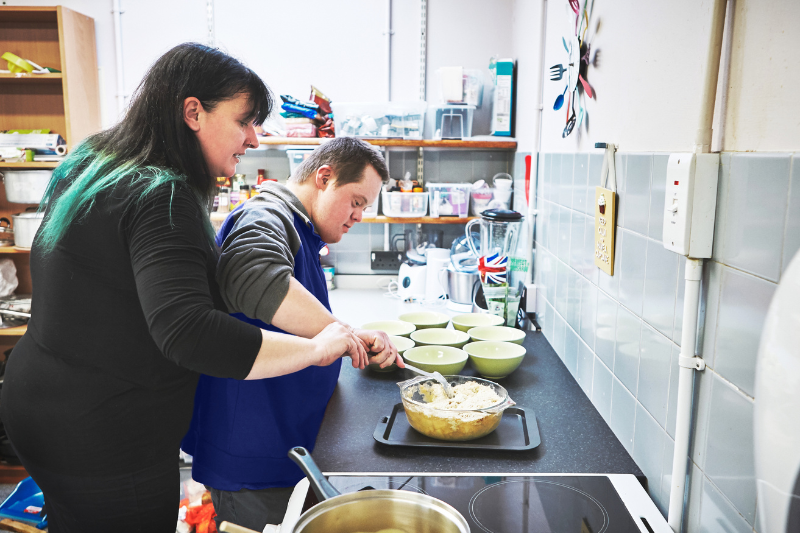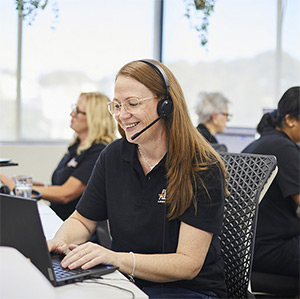(Updated for the 2025–26 NDIS Pricing Arrangements)
We speak with participants and carers every week who ask, “Can I use my NDIS plan for meals?” or “Will the NDIS fund an air fryer or thermomix or liquidiser?”
The short answer is: it depends on your needs and how the support relates to your disability.
This guide will walk you through what the NDIS generally funds for what we call “meal preparation and delivery” which is the only part of ready made meals the NDIS will fund.We will explain how this support is categorised, and how to tell if you can spend your funding on it.
We’ll also cover 10 common questions about NDIS meal-related supports — from ready-made meals to kitchen equipment and using Uber for deal delivery.
If Meal Preparation Supports Are Approved
Funding may be possible if:
- You can’t safely use a stove or handle knives due to your disability.
- You have limited mobility or fine motor skills that make cooking unsafe.
- You’re unable to lift pots or carry groceries.
- Preparing meals would take excessive time or energy away from your other daily living goals.
In those cases, meal support helps you maintain independence and health — both of which are consistent with the goals of the NDIS.
Understanding How the NDIS Funds Meals or ‘Meal Supports’
Where is this funding for meals in my NDIS plan?
Under the NDIS Pricing Arrangements and Price Limits 2025–26 (the document that the NDIS issues to explain the NDIS prices), food, meals or meal supports generally sit under the Core Supports category, specifically:
- Assistance with Daily Life (Support Category 01), which includes help with daily activities like cooking, shopping for food or personal care; and
- Core – Consumables (Support Category 03), which may cover low-cost assistive technology, and small or adaptive kitchen aids that make meal preparation safer.
What type of meals will the NDIS fund?
The NDIS may fund:
- The preparation and delivery cost of a meal service if you can’t cook due to your disability. For example, if you physically can’t cook safely, you may need meals delivered ready-to-eat
- The cost of a support worker time to help you prepare meals safely, and shop for food.
What type of food or meals will the NDIS NOT Fund?
The NDIS does not fund the cost of food itself, because everyone needs to eat, regardless of disability. Food is considered a ‘day-to-day living expense’ and so is not a disability-related expense.
How Funding Works for Meal Preparation and Delivery
The NDIS Pricing Arrangements 2025–26 explains that:
“Supports must be reasonable and necessary and directly related to the participant’s disability”.
This means the NDIS considers each case individually. They’ll look at:
- Whether the support helps you achieve your plan goals (for example, living more independently or maintaining health).
- Whether the need arises because of your disability, not just convenience.
- Whether the cost is reasonable compared to alternatives.
This means that your NDIS plan may include::
- Meal preparation assistance – this can be funded as part of your Core – Assistance with Daily Life budget.
- Meal delivery services – this can be partly funded, and you’ll still pay the cost of ingredients.
For example, if a meal service charges $14 per meal, and $6 covers ingredients while $8 covers preparation and delivery, the NDIS may fund the $8 portion only — if it’s considered reasonable and necessary.
Most prepared pood companies are familiar with the NDIS rules and will provide this breakdown in their invoice to you.
How do I know if I’ve been funded for Meal Preparation and Delivery?
Your NDIS plan will either:
- include meal preparation & delivery in the description of your Core funding
- include meal preparation & delivery as a ‘stated’ support
- have no reference to meal preparation & delivery, even though your planner agreed to it during your planning meeting (annoying).
When this happens you will need to request your ‘Planner Notes’ from the NDIS and send them to your Plan Manager.
An example of how this may appear in your plan is as follows:
Core
“Support with meal preparation and delivery/Help from a support worker to help prepare meals.”
“This includes help with house cleaning and other household tasks. Nutrition supports, including meal preparation This does not include the cost of food or ingredients.”
Stated Support
“Stated: Assistance with The Cost of Preparation And Delivery of Meals (quote required)”
The Role of Your Plan Manager and Meal Funding
Plan Managers like Plan Hero help you pay invoices correctly and stay compliant with the NDIS Pricing Rules and Arrangements.
We can’t approve or recommend meal funding in your NDIS plan, but we will:
- Help you understand what category of funding your plan needs to include
- Help you understand if you have funding in your NDIS plan to pay for any part of prepared meals
- Make sure NDIS meal providers charge within NDIS price limits.
- Process your meal prep payments quickly.
We speak with participants every day who want to double-check whether their meal service or kitchen purchase can be paid through their plan — and we’re always happy to explain what’s generally covered and what’s not.
FAQs:
Here are the 10 most common questions NDIS participants ask about meal preparation products and services, and how they’re generally treated under NDIS funding rules.
1. What meal preparation providers are approved by the NDIS?
Generally, the NDIS will fund the meal prep and delivery cost of meal delivery services like HelloFresh, Marley Spoon, or Lite n’ Easy provided that:
- The preparation and delivery part of the service is directly linked to your disability (for example, if you cannot prepare meals safely on your own).
- Your allied health professional recommends it as a reasonable and necessary support.
- Their invoices separate the cost of the meal preparation portion from the food cost portion. The food portion will need to be paid out of pocket.
Most companies, if you tell them it’s for NDIS supports, will send you an invoice which separates This type of support fits under Core – Assistance with Daily Life (Preparation and Delivery of Meals), which is listed in the NDIS Pricing Arrangements and Price Limits 2025–26.
2. What Frozen or Ready-Made Meals will the NDIS fund?
Generally, frozen or ready-made meals are partly fundable — but again, only for the preparation and delivery component.
For example:
- If you can’t use a stove safely due to mobility or sensory challenges.
- If you fatigue easily and can’t cook consistently.
In that case, a provider that prepares and delivers frozen meals might separate the cost of food from preparation and delivery. The food cost remains your responsibility; the rest may be claimed from your Core – Assistance with Daily Life budget if approved.
3. Will the NDIS fund a Thermomix?
Generally, the NDIS does not fund Thermomix appliances, because they’re considered high-end consumer kitchen products used by the general population.
However, funding may be possible in specific cases if:
- The Thermomix directly replaces a more expensive piece of assistive technology.
- It’s the most reasonable and necessary way for you to cook independently with reduced risk (for example, due to one-handed use, safety timers, or auto functions).
Strong evidence from an occupational therapist (OT) and it will need to be specifically approved and mentioned in your plan in order to be funded. If approved, it may fall under Capital – Assistive Technology (Assistive Products for Household Tasks).
4. Will the NDIS fund an Air Fryer?
Generally, air fryers are not funded, as they are considered common household appliances used by many people without disabilities.
However, funding may be possible if an air fryer:
- Provides a safer way for you to cook due to limited strength, dexterity, or vision.
- Allows you to prepare healthy meals independently without using an oven or stovetop.
If your OT recommends it as a reasonable and necessary aid to support independence and safety, it may be considered under Capital – Assistive Technology.
5. Will the NDIS fund a Blender or Food Processor?
Blenders and food processors are usually not funded, since they are standard kitchen items.
However, funding may be possible if they:
- Are needed for modified diets (e.g., pureed food due to swallowing difficulties).
- Are used for safety reasons, such as one-touch operation or adaptive handles.
In those cases, the item might be claimed under Low-Cost Assistive Technology (Core – Consumables) if it costs under $1,500, and you have approval to use your Core budget for low-cost AT.
6. Will the NDIS fund a Microwave?
Generally, the NDIS does not fund microwaves, as they are everyday household appliances.
However, funding may be possible in limited cases where a microwave:
- Is essential for safe and independent meal preparation.
- Replaces the need for a riskier appliance like a stovetop.
- Has specific adaptive features for accessibility (for example, tactile buttons or talking interfaces).
This would typically require a therapist’s report explaining why the microwave is a disability-related support, and would likely need to be approved or listed in your plan to be funded
7. Will the NDIS fund a Slow Cooker?
Slow cookers are generally not funded, as they are considered ordinary kitchen appliances.
However, funding may be possible if a slow cooker is prescribed by your OT as a safer or more energy-efficient way for you to prepare meals independently — for instance, if you fatigue easily or can’t stand at a stove.
If approved, it may be categorised as Low-Cost Assistive Technology or Assistive Products for Household Tasks under the NDIS Pricing Arrangements and Price Limits 2025–26.
8. Will the NDIS fund a Support Worker to help me prepare meals?
The NDIS commonly funds meal preparation by a support worker, if you are unable to prepare food safely or consistently due to your disability.
This includes:
- A support worker helping you plan and cook meals.
- Assisting with portioning or storing meals safely.
- Teaching or supporting you to build cooking skills.
The funding falls under Core – Assistance with Daily Life (Assistance with Household Tasks).
However, the NDIS will not fund a support worker to cook for the entire household or for convenience. The task must directly relate to your personal disability needs.
9. Will the NDIS fund Cooking Classes?
Generally, the NDIS may fund cooking classes if they are directly related to building independence and daily living skills.
For example:
- Learning to cook safely with adaptive techniques.
- Gaining confidence in meal planning or nutrition management.
- Working toward a goal in your plan (like “increasing independence at home”).
Classes designed purely for recreation or hobby purposes (like gourmet cooking courses) are not usually funded.
If supported by your goals, this may be covered under Capacity Building – Improved Daily Living or Core – Assistance with Daily Life.
10. Will the NDIS fund Adaptive Kitchen Tools?
Adaptive kitchen tools are often fundable, especially when they help you prepare meals safely and independently.
Examples include:
- One-handed cutting boards
- Weighted or easy-grip utensils
- Jar openers, kettle tippers, or automatic can openers
These items fall under Assistive Technology – Assistive Products for Household Tasks (Registration Group 0123).
Low-cost adaptive tools (under $1,500) can usually be claimed from your Core – Consumables budget, provided your plan allows flexibility for low-cost AT.
What does the NDIS not Fund?
While the NDIS can support meal preparation in disability-related contexts, it generally won’t fund:
- The cost of food ingredients (that’s an everyday expense).
- Luxury or convenience appliances without a clear disability-related purpose.
- Duplicate appliances (for example, buying two microwaves for convenience).
- Recreational cooking programs not linked to your plan goals.
- Non-disability-related meal services, such as HelloFresh for convenience.
Real Examples We See Every Week
We speak with families and participants all the time about meal supports. Here are two examples we’ve seen recently:
Example 1:
A participant with limited upper body mobility can’t safely chop or stir hot food. Their occupational therapist recommended a support worker assist with weekly meal preparation. This was approved under Core – Assistance with Daily Life.
Example 2:
A participant with a swallowing disorder (dysphagia) needed a high-powered blender for safe meal preparation. Their therapist provided evidence showing it was medically necessary. The item was purchased as Low-Cost Assistive Technology from their Core – Consumables budget.
In both cases, Plan Hero helped ensure the invoices were correctly coded and paid promptly, in line with the NDIS Pricing Arrangements.
How Plan Hero Can Help
At Plan Hero, we know how confusing NDIS meal funding rules can be. The difference between what’s “daily living” and what’s an “everyday expense” isn’t always clear.
We help by:
- Explaining what’s usually covered, so you don’t risk paying out of pocket for something that isn’t fundable.
- Checking your plan categories and ensuring claims are processed correctly.
- Responding quickly to all your queries — no long waits or call centres.
- Referencing your history, so you never have to repeat yourself.
If you’re unsure whether a meal-related purchase or service can be claimed, talk to us first. We’ll give you clear, honest guidance based on NDIS rules.
Need Help Understanding Your Meal Supports?
If you’re unsure what’s possible under your NDIS plan, our Plan Hero team is here to help.
We’ll explain your funding options in plain language, check which category applies, and make sure everything is claimed correctly and compliantly.
Reach out anytime — we’ll help you feel confident about using your NDIS plan to make mealtimes easier, safer, and less stressful.



